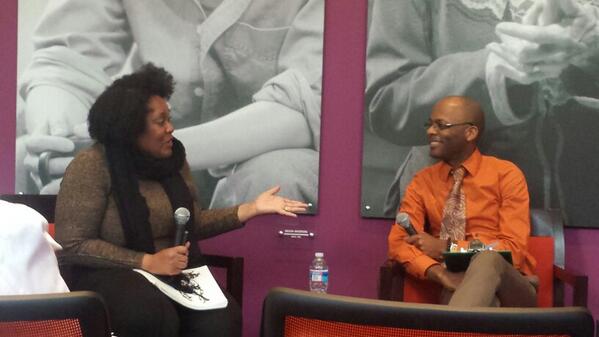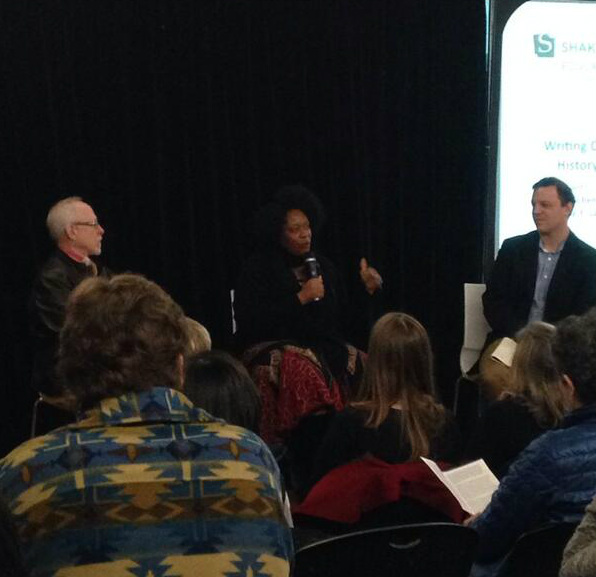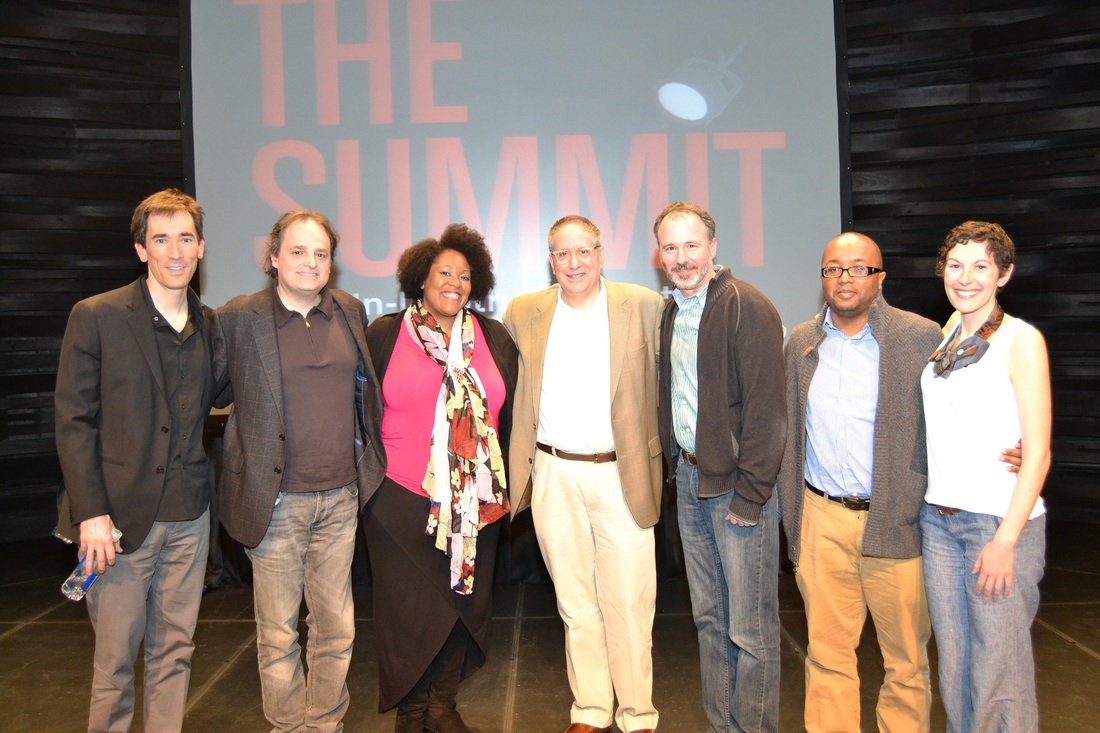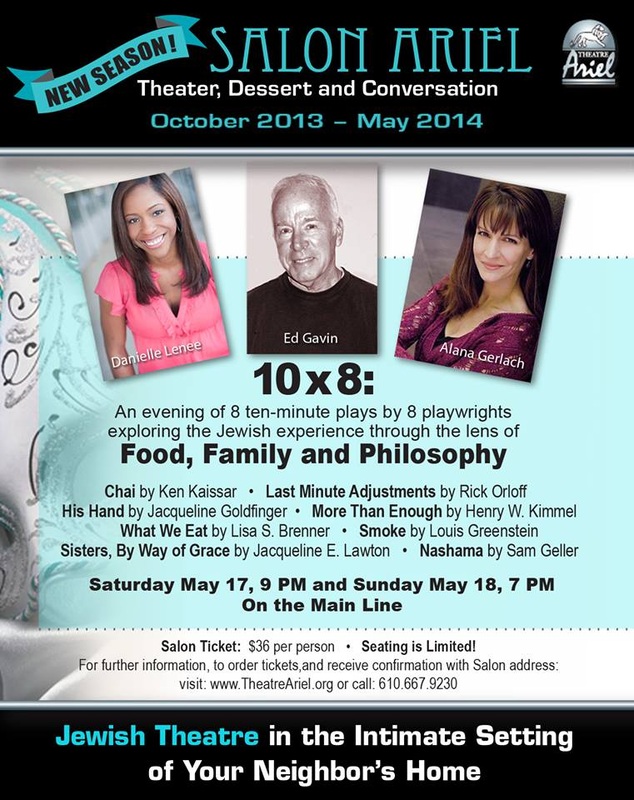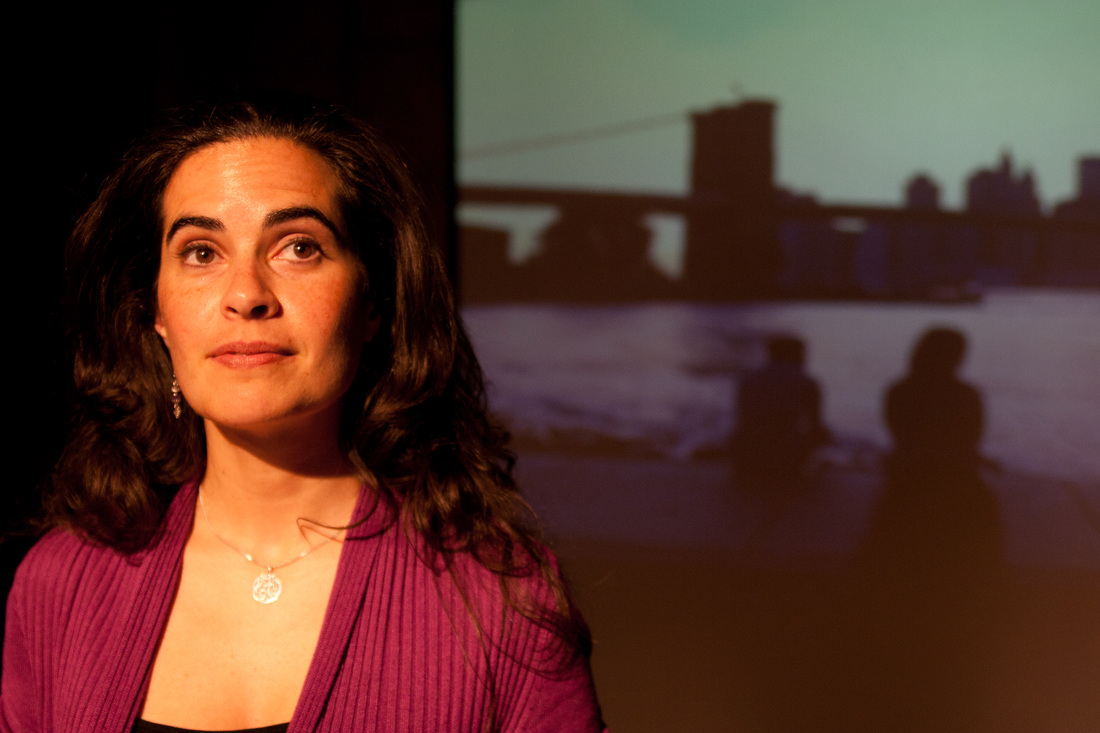|
Recently, I've been in a number of conversations with playwrights interested in learning how to find an agent. When asked this question, I always share the advice that Beth Blickers gave to me when I first approached her about five or six years ago. At that time, I was working freelance as a playwright, dramaturg, director, producer, and teaching artist. I was juggling a lot of contracts and working hard to find balance in my life. I already had several readings, workshops, and productions to my name. What's more (and by the grace of all the muses, word of mouth, and good networking), my plays were being read by artistic directors and literary managers at some rather exciting regional theatres. I was eager to become a part of the American Theatre in a more visible and viable way. Beth, being the wise and generous playwrights' angel that she is, read three of my plays and was excited by my voice. She put me in her back pocket, as it were, and told me to be patient. She offered me excellent counsel from time to time and introduced me to a number of folks who also took an interest in my work. Each time we connected, she told me to focus on my craft. I did and years later, but exactly on time, an amazing agent, the incomparable Morgan Jenness, found me. Officially, Morgan and I met at the 2012 TCG National Conference. I was there for the first time as a Young Leader of Color and she was my mentor. Morgan is someone who doesn't do anything in halves. We spent a year getting to know each another over lunches, emails, and at various conferences. She is someone I cherish deeply. We have similar values. I deeply admire and respect her fierce commitment to arts advocacy and social justice. In her actions and belief in me, she encourages me to be a better person. When she left Abrams Artists Agency, she made sure that I was in good and capable hands, which is how I came to work with the remarkable and talented Leah Hamos, who has been my source of strength, courage, and stability ever since. So, for me, finding an agent was about finding a mentor, collaborator, and friend. It also had to do with shaping my voice, continuing to network, strengthening my position in the local, regional, and national community, and determining what my specific contribution to the American Theatre would be. But every story is different and so, without further ado and with permission, here's the invaluable advice that Beth Blickers shared with me: When to Approach an Agent by Beth Blickers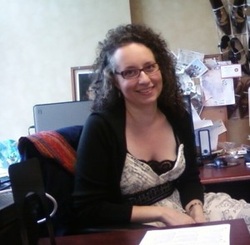 “If you’ve only written one play and it hasn’t been produced then it is decidedly too soon to look for an agent. And bear in mind that once an agent passes on repping you, you go into their database of people to whom they have said no. And I know for a fact that at some agencies that database is shared within the department. Meaning if you get told no by one agent and approach a different agent two years later, they look you up and you can wind up getting passed on again without being read afresh. The strongest moment to reach out to agents is when something nationally recognized is happening in your career, when you’ve built of fan base of people who know agents and can speak highly of you and when you are starting to bring in some income so they aren’t working entirely for free. At this point you’ll probably have met some agents in passing at theaters and panels, you’ll probably have worked with some directors who have agents (and are easy ways to get introductions), you’ll have artistic directors and literary managers who will make introductions on your behalf. And I hope you will have talked to represented artists about who they are with, who they know, who they like and why they like them, what agents are actually able to do for them, how they work well together (or don’t), so that you can thoughtfully talk with some agents and make a choice and work together happily for many decades to come. Don’t (and I’m sure every literary manager will second this list) send us a play you have never heard out loud, even if it’s just in your living room. Don’t tell me about the 22 full length plays, 78 one acts and 592 sonnets you’ve written. Don’t list all of the famous people you know if they’ve never done a thing to further your career. Don’t tell me you’ve been produced by a theater when it was a one night event. Be honest and straightforward. I’d rather a fairly empty resume with a genius cover note then a dazzling array of information that when I start to pick at it, falls apart like dust. And trust me, we check. If you tell me a theater is strongly considering your play I WILL ask that theater about it. And 99 times out of 100 the “strong consideration” means the writer sent them the play that week. Makes the writer look bad to me and the theater. Do network like mad, go to new play festivals, offer people a mid afternoon iced latte in exchange for an informational meeting, Google theaters, have a website, befriend writers and directors, invest energies in things other than theater, be interested in the world around you and be an interesting person yourself. Know what makes you unique and what you have to offer to the world of theater. The other day I chastised theaters who respond to queries about what they are looking for in a play with “good writing.” I’d say the same to any artist. If I ask you want you want to do in the theater please don’t tell me “write good plays and work with good people.” It tells me nothing about what makes YOU special. And if you don’t know what makes you special why do I care? To quote the great Liz Engleman “why this play, now.” I’d expand that and say agents are asking daily “why this writer, now.” The best writers have an answer. And my goodness they are a delight to represent.” Beth Blickers is currently an agent at Abrams Artists Agency, where she represents such writers, composers, directors and choreographers for theatre, television and film. Before joining Abrams, she was an agent at Helen Merrill Ltd. and the William Morris Agency, where she began work after graduating from New York University.
0 Comments
 On Saturday, April 26th, Boston's StageSource presented the Defining Gender Parity Town Hall. Hosted by Julie Hennrikus and Ilana Brownstein, here are the objectives, inquiries, and themes of the Town Hall: "In this Defining Gender Parity Town Hall, we want to have a conversation about what gender parity looks like for our theater community. Where are we now, and what are our future goals? What does "success" look like, and how do we get there? The Diversity/Inclusion/Gender Parity Task Force report talked about these three topics on stage (actors), back stage (playwrights, directors, designers, technicians, stage managers, crew), in the offices (administration, front of house), in the board rooms (and donor bases), and in the audiences. Gender parity is a conversation for all of these areas, though recent conversations have been around opportunities for playwrights and directors. We will not limit the conversation, though that context is helpful when we think about how to create the change we want (need) to see. There are a number of recent conversations that help inform this meeting. They include Pat Gabridge's blog posts with an overview of some of the numbers around playwrights and directors on New England stages, and Ilana Brownstein's blog post "Rounding Up The Summit"." While wasn't able to attend in person, I watched it live and thought it was an in-depth, thoughtful, and deeply engaging discussion. I don't know how often or in how many different ways we need to keep saying this, but sexism, like racism, is a pandemic issue. Just as we have to exercise our privilege to dismantle white supremacy, we must break down the barriers of patriarchy. We must challenge pervasive assumptions that rely on the notion of race and gender based mediocrity to promote and solidify exclusionary and discriminatory practices. White is not universal; male is not inherently best. We simply cannot thrive in either/or modalities. We are stronger together than apart. You can watch the Town Hall in its entirety below: Watch live streaming video from newplay at livestream.com Race and Representation at Everyman Theatre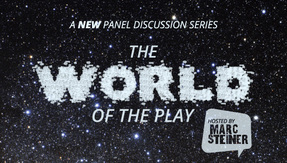 After watching the Defining Gender Parity Town Hall, I took the train to Baltimore to participate in Everyman Theatre's World of the Play panel discussion, Race and Representation: "Our greatest accomplishment. Our greatest shame." It was a powerful, complex, and challenging conversation that asked: "What is the personal cost of being a forerunner - a barrier breaker? Through her storytelling, Lynn Nottage reminds us of those who are marginalized by circumstance, yet fervently trying to assert their presence." Moderated by Marc Steiner, I was joined on the panel by Dr. Kimberly Moffitt (Professor of American Studies) and Otis Cortez Ramsey-Zoe (Lecturer of Theatre Arts). Click here to listen to the podcast. One of the final questions had to do with hope. Marc wanted us to meditate on what issues we thought would be laid to rest in generations to come. Interestingly, and not surprisingly, no one was able to provide a solid answer. For me, in reflecting on this production of By the Way, Meet Vera Stark, I feel that many of the race and gender based socio-economic and geo-political issues that we struggled against in the 1930s, that we marched against in the 1950s, and that we balled our hands and raised our fists against in the 1970s, continue in detrimental ways to this day. And yet...I still have hope that progress, incremental though it may seem, is being made. "Writing Our History" Panel at Shakespeare Theatre Company The next morning, Sunday, April 27th, I took part in the "Writing Our History" panel, which was part of Shakespeare Theatre Company's AsidesLIVE symposium around Henry IV, Parts 1 and 2, which Shakespeare wrote approximately 200 years after the historical events depicted. Moderated by STC's Literary Associate and Production Dramaturg, Drew Lichtenberg, I was joined on the panel by Robert Schenkkan, Pulitzer Prize winning playwright of Broadway's All the Way. "What is the history play," Lichtenberg ask. "People often throw those words about with complete confidence in the fixity of the genre, but when you look closer, 'the history play' becomes a surprisingly amorphous and constantly evolving term of art. I'm eager and excited to hold up models of the history play, both Shakespearean and contemporary, as we attempt to answer this surprisingly complicated and resonant question." Many of the issues I wrestled with during the Race and Representation panel bubbled under this conversation. Weeks later, this question that Drew asked resonates with me still, "What is the ethical obligation of contemporary theatre artists in representing history?" For me, the greatest obligation we have is to tell the stories of our communities, especially those who are marginalized and to speak truth to power. The greatest thing the Shakespeare Theatre Company (and perhaps even the Folger Theatre) can do is to commission writers of color to tell our stories and to adapt the classics for audiences today. This way, these new plays will be one day be the classics that theatres and historians 400 years from now will produce and study for a greater understanding of the generation that not only brought forth the greatest advancement of technology ever known to man, but also set us on the path to eradicating the ills of racism and sexism in this country. The Summit Part Three: Directors and Playwrights at Arena Stage By the time Monday rolled around, I was amped and ready. It was then that I took part in the long awaited and much anticipated final installment of The Summit hosted by Arena Stage and moderated by Washington Post theatre critic Peter Marks. The focus of the evening was on playwrights and directors. I was joined by Rachel Grossman, ringleader of the District’s innovative audience participation troupe, dog & pony dc; David Muse, Studio Theatre artistic director and director of Tribes; frequent Woolly Mammoth director/playwright Robert O’Hara (Antebellum and Bootycandy); Ari Roth, Theater J artistic director and author of last season’s Andy in the Shadows; and D.C.-area playwrights and members of Arena Stage’s inaugural Playwrights’ Arena collaborative writing group Norman Allen (Nijinsky's Last Dance). A few days ahead of the event, Peter emailed each of us and shared: "If you've been following along, you'll know the Summits have been lively, entertaining and even a bit provocative. As you're an especially brainy group, I'm going to try to make the questions friendly but challenging, and of course relevant to the issues facing playwrights, directors and artistic directors today. I think it would be helpful if you all think about the "meta" question of what role theater wants to function going forward in this society. Statistics indicate that a shrinking share of Americans opts for theatergoing as even a once-in-a-while experience. There are also those questions of who the theater you all so diligently strive to put on is for--and whether the playwriting and directorial opportunities are being shared equitably with, for instance, women and people of color." The event was live streamed and so I'm going to let you all experience this event for yourself. After the Summit, I wrote to Peter to thank him for including me and shared my thoughts on why I felt events like this were important:
"With this series, you've given leaders of the D.C. Theatre Community an opportunity to address issues that concern theatre artists locally, regionally, and nationally. From Gender Parity and Diversity and Inclusion to marketing and capitalization to the complex Artist and Arts Organization relationship and the unfortunately reality of our ever dwindling audiences, you are challenging each of us--theatre practitioners and audience member alike--to dig deep, engage, and find new and lasting ways to grow, nurture, and sustain the American Theatre." Yesterday, I was asked by someone inspired by my social media advocacy, "Do you ever feel that you’re ‘beating a dead horse’ when it comes to addressing issues of Diversity and Inclusion in the American Theatre?” As I work on rewrites of a play that may never be produced, here are my thoughts:
It’s disappointing when regional theatres continue to produce all/a majority of plays written by white men that are directed by all/a majority of white men. It’s disheartening that gender parity struggles to be intersectional and inclusive. It’s frustrating that issues of age, class, ability, and sexual orientation live in a land of etcetera. However, I remain hopeful and ever stalwart. I'm encouraged by an increasing number of individuals and theatre companies, who are embracing diversity, working to be more inclusive, and supporting a multitude of voices. What’s more, I am inspired, supported, and guided by so many men and women who are committed to creating spaces for equality and access for all theatre artists. But it’s hard. Hard as hell. Especially right now as seasons are announced and the practice of exclusion rears its ugly, disparaging systemic head. But doing nothing is harder still. So, I never think in terms of losing faith. I think in terms of time. How much time can I devote each day to bring awareness and support of others around these issues. For what little time I have on this earth, I will do all that I can to advocate for progress and change in the American Theatre. 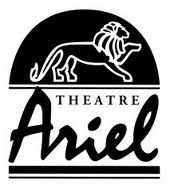 Theatre Ariel presents the 10X8: FOOD, FAMILY, and PHILOSOPHY festival on Saturday, May 17th and Sunday, May 18th. This SOLD OUT event will feature plays by Lisa Brenner, Jacqueline Goldfinger, Jacqueline E. Lawton, Hank Kimmel, Sam Geller, Louis Greenstein, Ken Kaissar, and Rich Orloff. Directed by Theatre Ariel's Artistic Director, the talented ensemble cast includes Lauren Berman, Ed Gavin, Alana Gerlach, Danielle Lenee, Juliana Messenger, and Miriam White. Theatre Ariel’s newest ten minute play fest invites 8 playwrights to create dramas and comedies celebrating the Jewish experience through the lens of “food, family, and philosophy”. The theme was inspired by a Yiddish joke: “A young yeshiva student is meeting his intended for the first time. Shy, frightened, and tongued-tied, he remembers the Rebbe’s advise – you can always talk about food, family, and philosophy!” 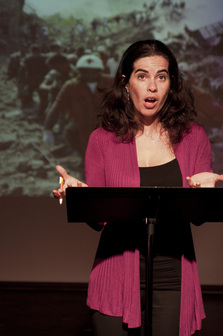 You're invited to attend a free reading of IN THE CROSSING by Leila Buck on Monday May 12th at 7:30pm present by Busboys and Poets, the reading will take place at the Studio Theatre's Mead Theatre. Directed by Shana Gold, IN THE CROSSING was originally developed with Shana Gold, Yuval Boim, Adam Green, Kathryn Grody, Lameece Issaq and Maya Serhan. This reading will feature Adam Abel, Leila Buck, Sara Buffamanti and Kathryn Kates. No reservations required, click here to learn more. In 2006, as Lebanese-American writer/performer Leila Buck was introducing her Jewish husband Adam to her family in Lebanon, war erupted between Israel and Hezbollah, and the couple found themselves caught in the crossfire. Now, several years and a trip to Israel later, they've been asked by Adam's aunt to share their experiences at a conference of the "Society for Intercultural Dialogue and Education." And you're invited to join them. Blurring the line between truth and fiction, theater and town hall, In The Crossing is an edge-of-your-seat live experience that probes the messy intersections of family and politics—the boundaries between us, and what happens when we choose to cross them. IN THE CROSSING has been developed with/at The Public Theater, New York Theatre Workshop, Lark Play Development Center, and Culture Project's Women Center Stage. Playwright's Notes"In The Crossing began as a series of urgent emails written between air strikes that summer to friends and colleagues about what my husband and I were witnessing on the ground in Lebanon - a point of view less widely seen in American media coverage of the conflict. Upon returning to New York, I began crafting a solo storytelling performance about our experience, doing readings across the U.S. with support from the Public Theater, New York Theatre Workshop, Epic, the Lark, Theater J, Queens Theatre in the Park, and a host of conferences and cultural centers from the Brooklyn Museum to Chautauqua Institution, which culminated in a mini-run with Culture Project’s Women Center Stage. In the talkbacks that followed each reading, I quickly realized that the most palpable conflict in the room was that amongst the audience about how I should tell this story – whether it was fair, biased, or even irresponsible - and the questions this raised for me as a playwright and performer. So I decided to write that journey into the play – adding other actors to represent these dissenting voices and my own struggle amidst them to find and hold my own truth. Through a unique and constantly evolving structure that combines storytelling, dramatic scenes, and structured improvisation, the audience is invited to become the fifth character in the play, whose responses, questions, and participation help shape a continually evolving journey. What I love most about theater – the thing that makes it so unique, and powerful, and bold- is the fact that performer and audience are in the same space, at the same time, together, sharing all the discomfort and danger, beauty and possibility of that interaction. Live performance is a precious space particularly in these virtual times. It helps you connect in a different way, and allows for a dialogue that must go both ways. So this play is an invitation: To listen to a story you may not have heard, from several perspectives; to speak up, whatever your perspective, and share your own; and to explore the ripples of that dialogue to more peaceful resolution of conflicts in living rooms and situation rooms around the world." -- Leila Buck About the Playwright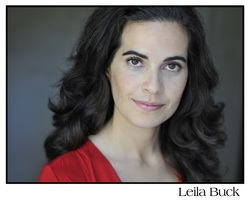 Leila Buck is a Lebanese American writer, performer and teaching artist. Her award-winning solo show, ISite, toured the U.S., Europe and China for more than ten years, and is published in Four Arab American Plays. Her shorter plays include ONE, performed for Epic Theatre Center alongside works by Craig Lucas, Neil LaBute, and Tony Kushner. Her acting credits include the off-Broadway run and international tour of AFTERMATH (NYTW - Drama League nomination) and the Wilma Theatre production of SCORCHED (Barrymore Award). Her theatrical work has been featured in The New York Times and American Theatre magazine, and in Etching Our Own Image: Voices from the Arab American Art Movement. In 2014-15 she will be artist-in-residence at Wesleyan University through Doris Duke Foundation’s Building Bridges grant. Leila holds a Master's in Educational Theatre and Middle East Studies from NYU. She is a member of the Emerging Writers Group at the Public Theater and a Usual Suspect with New York Theatre Workshop, and is currently performing in THE ADMISSION, now through May 18th at Studio Theatre. Click here to learn more.  We're just a few days away from The Dramatists Guild of America's Playwrights: Taking Control of Our Own Fates workshop at the Kennedy Center. Organized by Brent Englar, Gwydion Suilebhan, and Noelle Viñas, this day-long workshop will cover a wide variety of subjects of critical importance to dramatists in the 21st century. Click here to learn more. From 4:30-6:00 pm, there will be a Town Hall Brainstorming to discuss the fate of the DC and Baltimore playwriting community: the issues we're facing and how we'd like to address them. This should be a vital opportunity for connection, empowerment, and direction for all of us. When the Town Hall was announced, I connected with my dear friend and fellow playwright, D.W. Gregory about her thoughts. We had such a wonderful conversation that I decided to reach out to a several others who are planning to attend. I wanted to hear their thoughts on what they hoped to discussed. Each of them has generously agreed to share their thoughts here as well. Thoughts from D.W. Gregory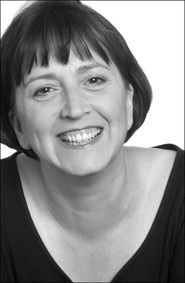 One of the hardest things for new playwrights to do is to meet actors and directors and to be taken seriously within the community. There is no question that writers who start out as actors or directors have a much easier time getting their work out in the world and getting productions. But there is a place in this world for playwrights who are writers only. What can be done to school young writers (young in experience) in how to work it? What opportunities can we create to help playwrights figure out the business of playwriting? The obligation of playwrights is to learn the craft -- learn it well. It seems there is not a culture of craft development in D.C. -- and there needs to be. So what can we do to foster this idea -- we are all on a learning curve, all the time. How can we learn from each other--how we can we better, smarter, more efficient, more adventurous practitioners of our craft? The other leg of the stool is learning to work collaboratively. This comes about mainly through actual work -- readings, productions, workshops. If you have few opportunities it is a critical part of your learning curve that is denied to you. So how do we create more opportunities to put playwrights, actors, directors, and designers in the same room? If it is not for purposes of production, that doesn't mean it can't be enormously informative and helpful to playwrights. ~~~~~~~~~~~~~~~~~~~~~~~~~~~~~~~~~~~~~~~~~~~~~~~~~~~~~~~~~~~ D.W. Gregory writes in a variety of styles and genres, but a recurring theme is the exploration of political issues through a personal lens. The New York Times called her “a playwright with a talent to enlighten and provoke” for her most produced work, RADIUM GIRLS, which has received nearly 300 productions worldwide since its premiere at Playwrights Theatre of New Jersey. A resident playwright at New Jersey Rep, Gregory received a Pulitzer Prize nomination for the Rep’s production of her drama THE GOOD DAUGHTER. Gregory is an affiliated writer with the Playwrights Center and a member of the Dramatists Guild. Thoughts from Jenny Splitter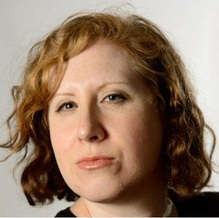 The crucial question seems to be how do we carve out our own space. That is both literal and specific -- how do we find and pay for performance, rehearsal and even advertising space -- and broader and abstract -- what kind of work do we want to do? How do we define ourselves as artists? How do we find and engage our audience? We might consider a model in which we work together to help everyone succeed (e.g., pooling resources, negotiating for space as part of a larger group, providing feedback and advice, creating an exchange to utilize our own intellectual capital and skills (legal advice, graphic design, branding, social media marketing, etc.). ~~~~~~~~~~~~~~~~~~~~~~~~~~~~~~~~~~~~~~~~~~~~~~~~~~~~~~~~~~~ Jenny Splitter is a storyteller, playwright and blogger living in Washington, DC. Her plays include The Dish (premiering at the 2014 Capital Fringe Festival), Birth Goddess and H Street Housewives. She has performed her stories for the Risk! podcast, SpeakeasyDC and Story League, and she blogs at groundedparents.com and mamaliciousinthecity.com. 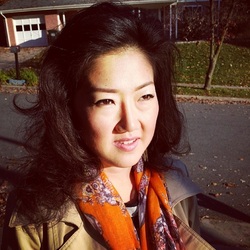 How can we earn a living wage while also having time to create and produce our art? Some folks are in school. Some are raising young children. How can we stay faithful to our art-making inner child when we have a host of distractions (life events, TV and film to catch up on, love lives)? I guess others have done it so we can somehow manage making work while living full lives. One playwriting professor, who had two young children, told me he wakes up at 5am everyday and does his work then. When I was a younger, I felt this need for validation. So I went to graduate school to study theater. I also felt that a professional production somewhere would launch my career. Oftentimes, it can. But the older I get, I feel like producing and directing my own work at the small scale. If the play works in my living room, then surely it may on a larger stage. I just feel more D.I.Y. these days instead of sitting around hoping and fantasizing that someone will fall in love with my work and produce it. ~~~~~~~~~~~~~~~~~~~~~~~~~~~~~~~~~~~~~~~~~~~~~~~~~~~~~~~~~~~ Born in South Korea and raised outside Washington, D.C., playwright Soo-Jin Lee is the daughter of shopkeepers. She grew up speaking both English and Korean and immigrated to the United States in 1982. Lee holds a M.F.A. in Theater from the University of Texas at Austin (2008) and a B.A. in Communication from George Mason University (2003). Her plays include Peaches, Tigers, Dragons, and Other Wise Tails!, Holiness People, and Why Koreans Don’t Hug. Thoughts from Patricia Connelly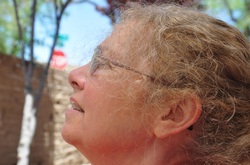 Playwrights are in a unique position among theater artists: we spend much of our time working alone and, unlike other theater artists, we don’t have many opportunities to do our work in the local community where we live. Besides producing our own work and starting our own companies, are there other ways we as playwrights can make ourselves a regular and integral part of the local theater community? Gender parity: are there more effective ways we local playwrights as a group can encourage and support efforts to bring about gender parity in the local theater community? Would it be to our advantage to organize formally – such as form a women’s committee within the DC-Area Playwrights group – to help raise awareness about gender parity and advocate for women playwrights among the local theater community? ~~~~~~~~~~~~~~~~~~~~~~~~~~~~~~~~~~~~~~~~~~~~~~~~~~~~~~~~~~~ Patricia Connelly is an award-winning playwright and director. Her plays have been presented at the Kennedy Center’s Page to Stage Festival and have been produced in Washington, D.C., and New Mexico. Her play, The Penny or the Stone, won the Robert Bone Memorial Playwriting Award at the Dallas Theatre Center. Other full-length plays include: What Happens in This Town, All the Sins of My Past Life, Harriet, Night Sky, and Princess Margaret. She has taught playwriting and theater and produced new play festivals at the University of New Mexico. She is a member of the Dramatists Guild and Playwrights Forum. Thoughts from Paco José Madden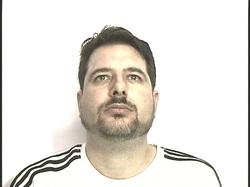 Access (the doors to get your script in front of a producer, director, AD is daunting for those who do not have the right connections, pedigree, and/or financial resources) Diversity (whether men of color or women or working class or disabled) DC does not have a playwright center to act as an advocacy group to voice issues and concerns of the local playwrights, provide resources, create opportunities, and foster community. Small communities exist such as the Welders and there is a strong on-line presence with the DC Playwrights Facebook Group, but there is not bricks-and-mortar institution that is the voice of DC area playwrights. (I don't necessarily believe a locally focused playwrights institute would solve all or any of the aforesaid issues and may just become another fjord that is difficult for playwrights to cross. However, without such a center to give, at the very least, some clout to local playwrights, we are little more than second class citizens in the minds of DC regional theater producers and decision makers. ~~~~~~~~~~~~~~~~~~~~~~~~~~~~~~~~~~~~~~~~~~~~~~~~~~~~~~~~~~~ Paco José Madden is a DC-native with a BA in Drama from Catholic University of America. He has self-produced three full-length dramatic works at the Capital Fringe Festival and has had his shorter works produced across the US. Paco has won several awards and grants from the DC Commission on the Arts and Humanities in playwriting and screenwriting. Among other works-in-progress, he is writing a steampunk stage version of Frankenstein. Thoughts from Brent Engler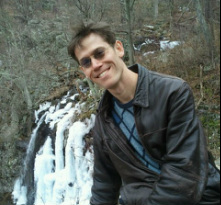 There are countless issues facing dramatists--the gap between new play development and new play productions; fair (or, more frequently, any) compensation; online piracy--and I'm sure we'll touch on most of them. But the most interesting challenge facing me, as a dramatist, is to figure out what theater can be --- needs to be --- to remain vital for diverse audiences in the 21st century. ~~~~~~~~~~~~~~~~~~~~~~~~~~~~~~~~~~~~~~~~~~~~~~~~~~~~~~~~~~~ Brent Engler is the Baltimore Regional Representative for the Dramatists Guild of America. My plays have been produced throughout Maryland, including Baltimore, as well as in New York, Chicago, and DC. I am also the director of the Mobtown Playwrights Group, an offshoot of Baltimore’s Mobtown Players; our season consists of public readings of three new plays by local writers, culminating in a full production of one of the selected plays. Thoughts from Ann-Marie Dittmann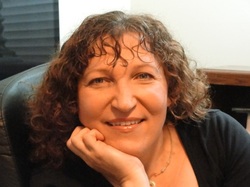 Looking at theater and therefore playwrighting as a business, how to we make it more viable, lucrative, appealing to audiences and producers? A challenge I see facing playwrights in general, and is only beginning to be addressed, is how to build momentum for multiple productions of a new work. Certainly NNPN has made a start, but are these playwrights seeing productions beyond the initial rollouts, and how do we build that sort of momentum on a larger scale. Part of addressing the challenge of obtaining multiple productions for a given play is also capacity building with audiences. Producers, especially at the larger theaters, note that new plays are difficult to sell. How then do we as writers, dramaturgs, and producers make new plays and new play development more appealing to a broader audience, so that they seek new work? How do we make DC a reliable “pipeline” for New York or other larger producers? Or should we be trying to. Having worked at Goodspeed Musicals, I know that there was quite a strong audience for their new work, but that was cultivated over time and largely due to Goodspeed’s reputation for sending workshop shows or transferring shows to Broadway. People were excited by the possibility of seeing the next big Broadway show before it hit New York. How do we build that sort of interest here? Or should we? Is it better to cultivate a larger interest in new work for its own sake? If so, how do we build that sort of audience interest/ buy in to new plays? ~~~~~~~~~~~~~~~~~~~~~~~~~~~~~~~~~~~~~~~~~~~~~~~~~~~~~~~~~~~ Ann-Marie Dittmann is a freelance Dramaturg. She recently began her fourth year as a Helen Hayes Awards Judge, this year joining the New Play Panel. Previous dramaturgical positions include: Audience Enrichment Manager at Arena Stage (2001-2004) and Literary Assistant at Goodspeed Musicals (1990-1992). She holds a BFA in Theater Studies, Dramaturgy from Boston University and a MA in Theater History and Dramatic Literature from Tufts University. She has recently returned to playwriting after a hiatus that has lasted since her undergraduate days, when her play, The Last Man, was produced as part of the Parkland College Original Playwrights Workshop. Thoughts from Kitty Felde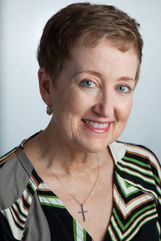 The greatest challenge is time. The day job consumes me. There are only so many hours in a day. I carve out the early mornings – long before my Pasadena public radio colleagues are awake - for the work I care about, my characters and magical worlds that seem much more real to me than that white dome on Capitol Hill. I dream of long, uninterrupted days that I can call my own to be a 24/7 playwright. ~~~~~~~~~~~~~~~~~~~~~~~~~~~~~~~~~~~~~~~~~~~~~~~~~~~~~~~~~~~ By day, Kitty Felde covers Capitol Hill for public radio. But in real life, she's an award-winning playwright. Work includes a courtroom drama about the Bosnian war (A PATCH OF EARTH, winner Maxim Mazumdar New Play Competition), an adaptation of stories by Nikolai Gogol (GOGOL PROJECT, winner 2009 LA Drama Critics Circle Award), even a one-woman show with a ghost (ALICE, an evening with the tart-tongued daughter of Theodore Roosevelt, named Washington Post "Critic's Pick" at the Capital Fringe Festival. She co-founded Theatre of NOTE in Hollywood and ran the playwriting program at HOLA Youth Theatre in LA. While Playwrights: Taking Control of Our Own Fates workshop won't be livestreamed, there are several bloggers and tweeters in this group. To follow the conversation, use #PwFate #newplay.
|
My BlogI'm a playwright, dramaturg, and teaching artist. It is here where you'll find my queries and musings on life, theater and the world. My posts advocate for diversity, inclusion, and equity in the American Theatre and updates on my own work. Please enjoy!
Categories
All
Archives
June 2020
Reading List
|
